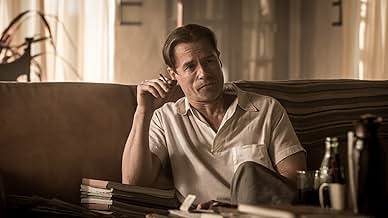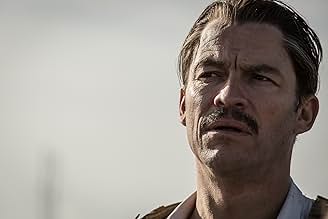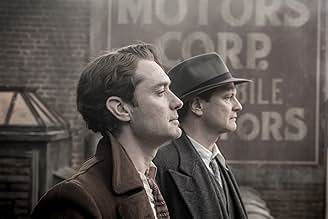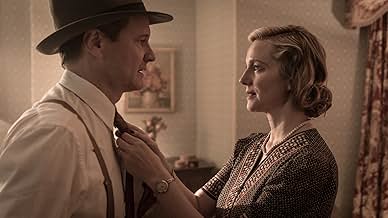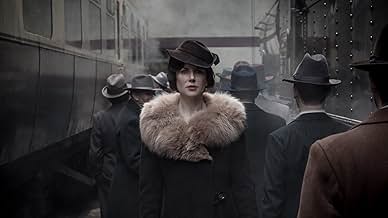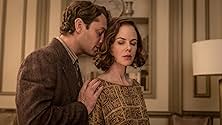A época de Max Perkins como editor do livro na Scribner, onde supervisionou trabalhos de Thomas Wolfe, Ernest Hemingway, F. Scott Fitzgerald e outros.A época de Max Perkins como editor do livro na Scribner, onde supervisionou trabalhos de Thomas Wolfe, Ernest Hemingway, F. Scott Fitzgerald e outros.A época de Max Perkins como editor do livro na Scribner, onde supervisionou trabalhos de Thomas Wolfe, Ernest Hemingway, F. Scott Fitzgerald e outros.
- Prêmios
- 1 vitória e 6 indicações no total
Angela Sant'Albano
- Bertha Perkins
- (as Angela Ashton)
Ray Strasser King
- James, Mailroom Clerk
- (as Ray Strasser-King)
- Direção
- Roteiristas
- Elenco e equipe completos
- Produção, bilheteria e muito mais no IMDbPro
Avaliações em destaque
Colin Firth and Jude Law Portray editor Max Perkins and his newest client, Tomas Wolfe. Perkins is a tight wound package of seriousness, work being his life. Wolfe is a frenetic writer, eating up everything around him with voracity. The polar opposites take on Wolfe's first novel, "Look Homeward, Angel." I admit, Law's Wolfe is energizer- bunny out-of-control frenetic at times, but it's that kind of mind that gave us one of the greatest (if not the greatest) American novels of all time. Having read "Angel," I completely bought into it. The relationship between editor and writer becomes extremely close, at times casting aside the women in their lives. Laura Linney is Louise Perkins, devoted wife to Max and their 5 daughters. She is also trying to keep her own writing career alive, with little help from her work obsessed husband. Nicole Kidman is Aline Bernstein, a married woman currently shacking up with Wolfe. She was his inspiration in writing "Angel" and is over zealously jealous of Tom's relationship with Max. Like, seriously, wack-job crazy. This role was the weak link for me, didn't like her from her second appearance on screen. The movie moves through their lives, another published book, and on to Wolfe's untimely death. (I am pretty sure that isn't a spoiler.) I don't want to go in to the plot anymore, except to say that I agree with another reviewer about the scene in the jazz club. A really great way to show how minds, and the streaming of thought, can be so different between people.
The cinematography is beautiful, sepia tones bring you back to the years right before and during the depression. Extravagance and soup kitchens, back-to-back. The music bangs out with Wolfe's bombastic behavior, and mellows with Max.
This movie is a movie about writers and readers, for what editor isn't a closet writer? It's also for the same audience, with several nods to a few other greats of that period; Hemingway and F. Scott Fitzgerald, but mostly, to Wolfe. When Max is reading "Angel" through for the first time, his daughter walks in. She looks at the page and says, "Wow, that's a really long paragraph" and Max answers "It started four pages ago..." THAT is Wolfe. That book was the most difficult book I have ever read. This movie is also about, who exactly is the genius? Wolfe is, obviously. But does that make Max, who edited, made these books marketable, and made Wolfe a celebrity of his day, any less of a genius? That is left for the viewer.
The cinematography is beautiful, sepia tones bring you back to the years right before and during the depression. Extravagance and soup kitchens, back-to-back. The music bangs out with Wolfe's bombastic behavior, and mellows with Max.
This movie is a movie about writers and readers, for what editor isn't a closet writer? It's also for the same audience, with several nods to a few other greats of that period; Hemingway and F. Scott Fitzgerald, but mostly, to Wolfe. When Max is reading "Angel" through for the first time, his daughter walks in. She looks at the page and says, "Wow, that's a really long paragraph" and Max answers "It started four pages ago..." THAT is Wolfe. That book was the most difficult book I have ever read. This movie is also about, who exactly is the genius? Wolfe is, obviously. But does that make Max, who edited, made these books marketable, and made Wolfe a celebrity of his day, any less of a genius? That is left for the viewer.
I find it hard to understand how this excellent film is getting negative reviews from critics. It is like a breath of fresh air for thinking movie goers. It is a thoughtful, intelligent and highly entertaining look at Maxwell Perkins, an editor who as he said wanted to bring "good books" to the public. He did, bringing us the works of Fitzgerald, Hemingway and Thomas Wolfe who is the focus of the film. It gives a historical perspective of two opposites (Perkins and Wolfe) who working together create something substantial. Perkins is a strong main character with a noble moral center, beautifully underplayed by Firth. When did we last see someone acting nobly in a film? In contrast, to the larger than life and decadent Wolfe (I had no idea Wolfe was played by Jude Law, until after the film) Law immerses himself in the character. The fact that this is a true story makes it all the more compelling. My fifteen year old daughter who is well versed in the writings of both Fitzgerald and Hemingway encouraged me to see Genius. We both walked away exhilarated; the way you feel after seeing a really good movie that transported you somewhere else. The Director, writer, actors and composer/ scorer all did a first rate job to help bring a to bring a great film to the public.
"O lost, and by the wind grieved, ghost, come back again." ― Thomas Wolfe, Look Homeward, Angel
Max Perkins (Colin Firth) was the genius Scribner's magazine editor, who helped Hemingway, Fitzgerald, and Wolfe become iconic American writers. The watchable Genius, directed by Michael Grandage with a sure understanding of drama, is mostly Thomas Wolfe's (Jude Law) story. The taciturn Max provides the necessary guidance to make sure the book belongs to the writer while Max delivers "good books into the hands of readers."
Although the film is engrossingly placed in Perkin's pv, Wolfe dominates through his exuberant personality and unending energy. While Firth plays Perkins as the conservative but imaginative editor, Law is the reason to see the film, a brilliant acting turn reminiscent of his over-the-top Dom Hemingway. Law simply has never been better than as Wolfe.
The sepia look of the film is appropriate to the 1929 setting of NYC, and Nicole Kidman as his other muse, Aline Bernstein, is memorably smart and vulnerable when it comes to dealing with manic Wolfe. Although Laura Linney as Louise Perkins is lost in spotty, low energy appearances, her general good cheer carries nicely for a Perkins of whom the audience has grown fond.
Because I am always seeking a biography that will show the creative labors of artists, Genius satisfies me when Perkins and Wolfe struggle over the manuscripts. After experiencing Genius, I have seen two sterling examples.
Max Perkins (Colin Firth) was the genius Scribner's magazine editor, who helped Hemingway, Fitzgerald, and Wolfe become iconic American writers. The watchable Genius, directed by Michael Grandage with a sure understanding of drama, is mostly Thomas Wolfe's (Jude Law) story. The taciturn Max provides the necessary guidance to make sure the book belongs to the writer while Max delivers "good books into the hands of readers."
Although the film is engrossingly placed in Perkin's pv, Wolfe dominates through his exuberant personality and unending energy. While Firth plays Perkins as the conservative but imaginative editor, Law is the reason to see the film, a brilliant acting turn reminiscent of his over-the-top Dom Hemingway. Law simply has never been better than as Wolfe.
The sepia look of the film is appropriate to the 1929 setting of NYC, and Nicole Kidman as his other muse, Aline Bernstein, is memorably smart and vulnerable when it comes to dealing with manic Wolfe. Although Laura Linney as Louise Perkins is lost in spotty, low energy appearances, her general good cheer carries nicely for a Perkins of whom the audience has grown fond.
Because I am always seeking a biography that will show the creative labors of artists, Genius satisfies me when Perkins and Wolfe struggle over the manuscripts. After experiencing Genius, I have seen two sterling examples.
It's a movie about Thomas Wolfe and Max Perkins, with four great actors: Colin Firth as Perkins, sporting a New England accent with overtones of having studied in England; Jude Law as Wolfe, sporting a generic Southern accent; Laura Linney as Mrs. Perkins and the always welcome Nicole Kidman as Wolfe's mistress. It's acting pyrotechnics time and extremely satisfying.
"Genius" is the story of the great editor Maxwell Perkins and his relationship with Thomas Wolfe, author of Look Homeward Angel, You Can't Go Home Again, and other novels and stories.
One thing before I start - the IMDb message board has to be the only place where people ADMIT they've never heard of Thomas Wolfe, much less read anything he wrote. I'm not sure I would be so forthcoming with that info.
The cast is fantastic: Colin Firth as Perkins, Jude Law as Wolfe, Laura Linney as Mrs. Perkins, and Nicole Kidman as Aline Bernstein, who brings Wolfe's novel to Perkins in real life.
Perkins is shown as a hard-working man, working with people like Fitzgerald and Hemingway and trying to balance his work with family, which consists of a wife and five daughters. He reads Wolfe's 300,000+ word novel and realizes the man is great genius - he also writes too many words.
When he talks to Wolfe, he realizes why - he talks too many words, too. He's unmarried and having an affair with stage designer Aline Bernstein. It's a turbulent relationship that lasts around five years.
His relationship with Perkins is turbulent too. At first Wolfe accepts Perkins' drastic cuts in his work; later on, he fights them. Nevertheless, Wolfe becomes a son to Perkins and Wolfe considers him his only friend.
Jude Law and Nicole Kidman are unrecognizable in makeup, hair, and accent, and they both do terrific jobs. Law is a bombastic, exuberant, undisciplined Wolfe; Firth, who actually looks more like Thomas Wolfe than Law, is always excellent. Here he plays a restrained man who allows room for the temperaments of his various writers and attempts to be the voice of reason.
Guy Pearce has a small role as F. Scott Fitzgerald. Something I read said he stole the movie. I love Guy Pearce, I would see him in anything (and have) but to me he wasn't Fitzgerald. Fitzgerald was a sweet-looking man, also a weak and drunken one, and Pearce did not portray that. Probably he did what the script and director dictated.
I found this movie a good story that was not well-paced and on the talky side. I know today we're not used to movies with a lot of dialogue, but there's always room for sharp, witty dialogue as in "All About Eve," for instance. This didn't have enough of that kind of writing and became tedious and sagged in spots.
The end of the film is very touching. I recommend seeing this for the performances.
One thing before I start - the IMDb message board has to be the only place where people ADMIT they've never heard of Thomas Wolfe, much less read anything he wrote. I'm not sure I would be so forthcoming with that info.
The cast is fantastic: Colin Firth as Perkins, Jude Law as Wolfe, Laura Linney as Mrs. Perkins, and Nicole Kidman as Aline Bernstein, who brings Wolfe's novel to Perkins in real life.
Perkins is shown as a hard-working man, working with people like Fitzgerald and Hemingway and trying to balance his work with family, which consists of a wife and five daughters. He reads Wolfe's 300,000+ word novel and realizes the man is great genius - he also writes too many words.
When he talks to Wolfe, he realizes why - he talks too many words, too. He's unmarried and having an affair with stage designer Aline Bernstein. It's a turbulent relationship that lasts around five years.
His relationship with Perkins is turbulent too. At first Wolfe accepts Perkins' drastic cuts in his work; later on, he fights them. Nevertheless, Wolfe becomes a son to Perkins and Wolfe considers him his only friend.
Jude Law and Nicole Kidman are unrecognizable in makeup, hair, and accent, and they both do terrific jobs. Law is a bombastic, exuberant, undisciplined Wolfe; Firth, who actually looks more like Thomas Wolfe than Law, is always excellent. Here he plays a restrained man who allows room for the temperaments of his various writers and attempts to be the voice of reason.
Guy Pearce has a small role as F. Scott Fitzgerald. Something I read said he stole the movie. I love Guy Pearce, I would see him in anything (and have) but to me he wasn't Fitzgerald. Fitzgerald was a sweet-looking man, also a weak and drunken one, and Pearce did not portray that. Probably he did what the script and director dictated.
I found this movie a good story that was not well-paced and on the talky side. I know today we're not used to movies with a lot of dialogue, but there's always room for sharp, witty dialogue as in "All About Eve," for instance. This didn't have enough of that kind of writing and became tedious and sagged in spots.
The end of the film is very touching. I recommend seeing this for the performances.
Você sabia?
- CuriosidadesA. Scott Berg's biography "Max Perkins: Editor of Genius", on which the film is based, won the National Book Award in 1978.
- Erros de gravaçãoMaxwell Perkins tells Thomas Wolfe his book needs a new title that will appeal to potential purchasers, and gives the example of F. Scott Fitzgerald changing the title of a novel from "Trimalchio in West Egg" to "The Great Gatsby." The real Perkins, as Fitzgerald's editor, certainly would have known that "The Great Gatsby" was a flop upon its release in 1925 and did not sell well until the 1950s.
- Citações
Aline Bernstein: I don't exist anymore. I've been edited.
- Cenas durante ou pós-créditosThe title "Genius" appears on the screen 9 minutes into the movie.
- ConexõesReferenced in The Tonight Show Starring Jimmy Fallon: Jude Law/Keri Russell/Fall Out Boy (2015)
- Trilhas sonorasFlow Gently Sweet Afton
(Sottish traditional)
Composed by Jonathan E. Spillman
(1873)
Performed by London Voices
Principais escolhas
Faça login para avaliar e ver a lista de recomendações personalizadas
- How long is Genius?Fornecido pela Alexa
Detalhes
- Data de lançamento
- Países de origem
- Centrais de atendimento oficiais
- Idiomas
- Também conhecido como
- Pasión por las letras
- Locações de filme
- Empresas de produção
- Consulte mais créditos da empresa na IMDbPro
Bilheteria
- Faturamento bruto nos EUA e Canadá
- US$ 1.361.045
- Fim de semana de estreia nos EUA e Canadá
- US$ 98.274
- 12 de jun. de 2016
- Faturamento bruto mundial
- US$ 7.435.006
- Tempo de duração1 hora 44 minutos
- Cor
- Mixagem de som
- Proporção
- 2.35 : 1
Contribua para esta página
Sugerir uma alteração ou adicionar conteúdo ausente

Principal brecha
What is the streaming release date of O Mestre dos Gênios (2016) in Australia?
Responda






